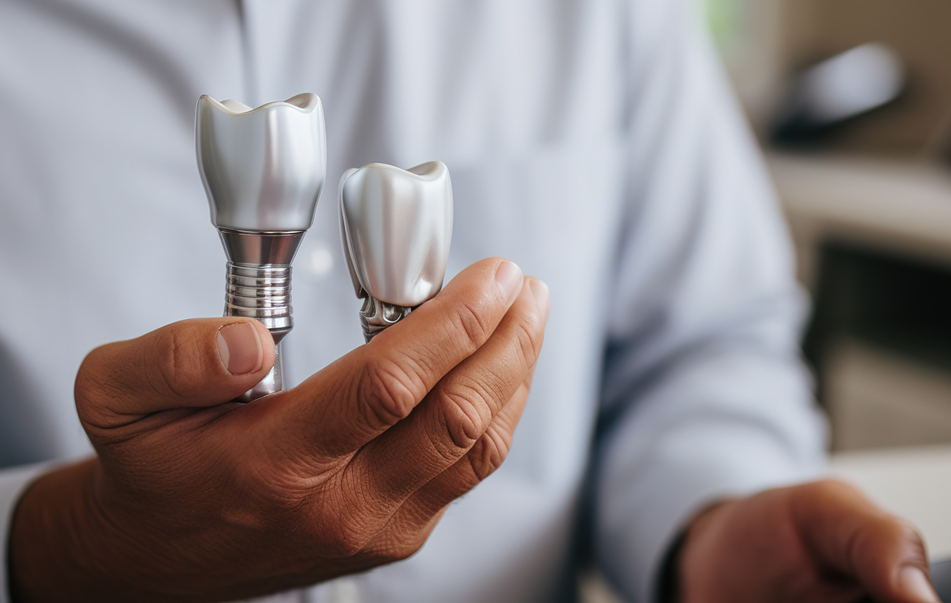What to Know About Dental Implants for Seniors
 Admin - Dental Implants » Periodontics
Admin - Dental Implants » Periodontics
 Feb 2, 2024
Feb 2, 2024
Dental Implants for Seniors
- Effectiveness in Older Age:
- Dental implants are just as effective and long-lasting in older age as they are in younger patients.
- They can positively impact physical health and boost confidence in older individuals.
- What Are Dental Implants?
- Dental implants are artificial tooth roots shaped like screws.
- Placed in the jawbone by an experienced dentist, they bond with natural bone, serving as a base for supporting artificial teeth (crowns).
- A connector (abutment) holds the crown, which is custom-made to match existing teeth.
- Dental Implant Procedures:
- Consultation: Examination, X-rays, discussion of options, and a plan for surgery.
- Dental Implant Placement: Implant inserted into the jaw, often with minimal discomfort.
- Osseointegration: Bonding of implant and jawbone for a strong foundation.
- Abutment Placement: Connector placed on the implant after osseointegration.
- Attach New Teeth: Custom-made artificial tooth or teeth created after gum healing.
- Check-ups: Regular follow-up appointments to ensure proper healing.
- Post-Surgery Management:
- Common Experiences: Swelling, minor bleeding, bruising, and pain at the implant site.
- Stitches: Usually dissolve on their own; if not, the doctor removes them.
- Medications: Pain medication or antibiotics may be recommended.
- Tips for Care:
- Dental Hygiene: Regular brushing and flossing.
- Regular Check-ups: Periodic professional cleanings and check-ups.
- Avoiding Damaging Habits: Refraining from chewing hard substances, ice, or tobacco.
- Possible Issues and Solutions:
- Bone Fusion: Successful in most cases, but if not, the implant can be removed and retried later.
- Maintaining Implants: Emphasizes good oral hygiene, professional care, and avoiding damaging habits.
- Potential Risks: Bleeding disorders, infections, allergic reactions, nerve proximity issues, and implant rejection.
- Seeking Help:
- Symptoms of Concern: Pain, swelling, fever, chills, or any signs of rejection.
- Immediate Action: Return to the dentist if experiencing issues or symptoms.
Dental Implants in the Elderly Population: A Long-Term Follow-up
This study, titled “Dental Implants in the Elderly Population: A Long-Term Follow-up,” aimed to evaluate the survival and success of dental implants in older adults aged 60 years and above. The research also sought to identify indicators and risk factors associated with the success or failure of dental implants in this demographic.
Key Details
- Authors: Sharon M Compton, Danielle Clark, Stephanie Chan, Iris Kuc, Berhanu A Wubie, Liran Levin.
- Publication Information:
- PMID (PubMed ID): 28095520
- DOI (Digital Object Identifier): 10.11607/jomi.5305
Methodology
- Study Design: Historical prospective study.
- Cohort: Patients born prior to 1950 who received dental implants in a single private dental office.
- Sample Size: 245 patient charts and 1,256 implants from one dental clinic.
- Age at Implant Placement: Mean age was 62.18 ± 8.6 years.
- Smoking: 9.4% of the studied cohort reported smoking.
Results
- Implant Survival Rate: Overall survival rate was 92.9%, with 7.1% of implants having failed.
- Marginal Bone Levels: Marginal bone loss (exposed threads) observed in 23.3% of implants.
- Factors Influencing Survival:
- Generalized or severe periodontal disease negatively influenced implant survival probability.
- Implants placed in areas with bone augmentation prior to or during surgery had different longevity compared to those without augmentation.
Conclusion: The study concluded that dental implants can be successfully placed in older adults. However, various factors play a role in the long-term success of implants. Special consideration is advised before placing implants in older adults to address and mitigate the influence of potential risk factors.
Implications: This research provides valuable insights for dental practitioners working with elderly patients. It highlights the importance of assessing and managing risk factors, such as periodontal disease and the need for bone augmentation, to enhance the success and longevity of dental implants in the older population.
Trending News
-

New Device Detects Gingivitis Early Admin
-

Non Toxic Dental Fillings : BPA, BHT, HMBP, DPCL, TPSb, HEMA, TEGDMA Free Admin
-

Essential Questions for Your Oral and Maxillofacial Surgeon Admin
-

Why Root Canals Fail? | The Usual Suspects Meredith Y. Newman Endodontist Fresno
-

Exploring Dental Implants as a Tooth Replacement Option Admin
